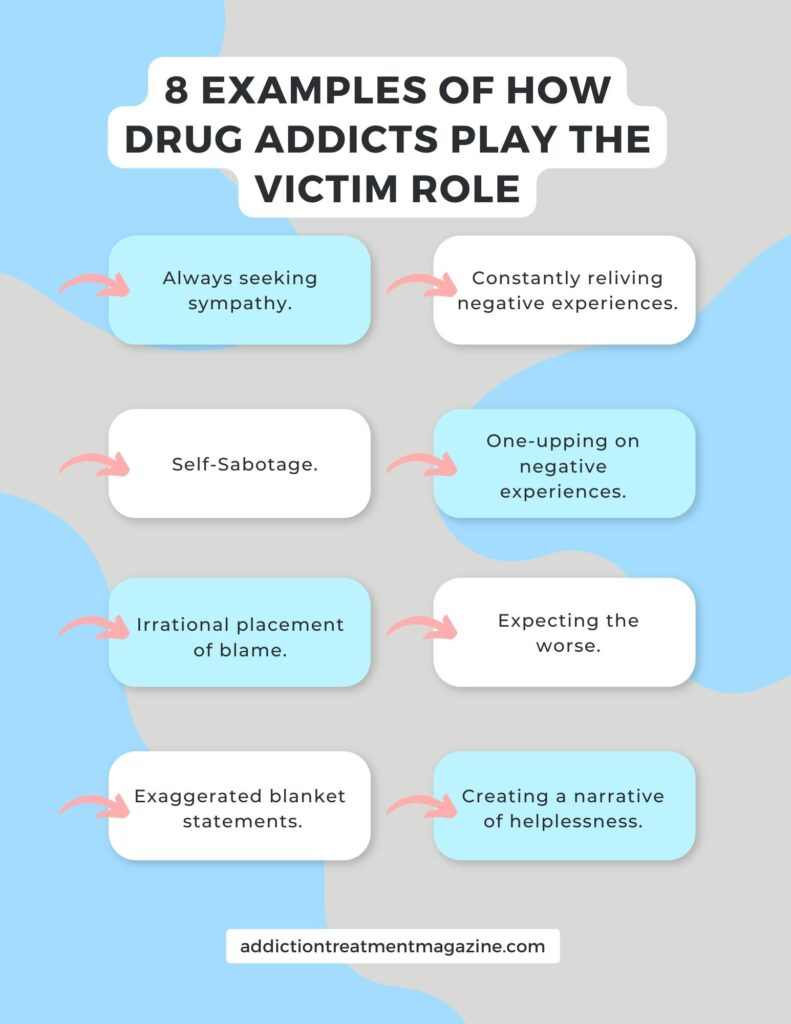Addiction and the victim mentality often go hand-in-hand. Whether consciously or unconsciously, many drug addicts self-victimize to continue their unhealthy coping habits or to deny that they have a problem at all. Playing the victim also takes destructive behavior a step further by preying on the sympathy of those closest to them, and turning them into enablers. This personality trait is dangerous, destructive, and a major roadblock on the path to sobriety.
What is the Victim Mentality?
This behavior goes by many names: self-victimization, victim complex, victim identity, victim syndrome, and even negative narcissism (a term tied to covert narcissism). The victim mentality is an acquired personality trait that causes individuals to think “everyone/everything is out to get me.” Common phrases associated with this destructive behavior are:
- “Why did you do this to me?”
- “Why does this keep happening to me?”
- “You don’t understand what I’m going through”
- “Everything always goes wrong”
- “It’s not fair”
- “Yes, but”
Adopting a victim mentality is more vicious than simply having a pessimistic outlook on life. These individuals feel that things happen to them, rather than as a result of events they had control over. This in turn leads to a feeling of apathy where it seems pointless to try and prevent any “bad things” from occurring. While this fatalistic attitude is already detrimental in its own right, the victim mindset is particularly dangerous amongst substance abusers.
Why Drug Addicts Play the Victim
Addicts frequently, although perhaps unintentionally, play the victim as a defense mechanism to rationalize their self-destructive behavior. By creating a narrative of helplessness, they can shirk responsibility for their actions and instead blame their substance abuse on external factors. This behavior reinforces unhealthy coping habits and distances oneself from personal responsibility – a disastrous recipe for someone with an addiction.
In many instances, an individual with a victim complex may unconsciously put themselves
The victim mentality is not only damaging for the individual, but for their relationships as well. When a drug addict plays the victim, through a dynamic of pity, guilt, or some combination of the two, the addict uses their victim status to turn loved ones into enablers. By perpetually declaring themself as a victim of circumstance, their friends and family may continue to supply money or the substances (“they need it”), or deny the addict has a substance abuse issue at all (“it’s not their fault”).
Here are some examples of a self-victimizing drug addict:
- Declaring that you’re overwhelmed by your credit card debt, and when a friend loans you some money, using it for drugs or alcohol
- Telling your spouse that if they didn’t argue with you as much you wouldn’t have to drink all the time

How To Identify the Victim Mentality
Whether done intentionally or not, this psychological scapegoating can be tricky to identify. Depending on how close a loved one is to the addict, it may be difficult to separate their own personal feelings of guilt or concern from this manipulative behavior.
- Always seeking sympathy
- Constantly reliving negative experiences
- Self-Sabotage
- One-upping on negative experiences
- Irrational placement of blame
- Expecting the worse
- Exaggerated blanket statements
How to Talk to an Addict With a Victim Complex
Convincing a drug addict playing the victim role that they need to seek professional help can be particularly challenging. Namely, because this denial is done unconsciously or has become so ingrained that it’s now their default thought process. Since emotional manipulation plays a big role in this disorder, it’s important to toe the line of acknowledging them without feeding their desire for sympathy. Being overly sympathetic may reinforce their narrative, while being dismissive might push them further into feelings of isolation and being misunderstood.
Acknowledge – don’t agree
Avoid adding fuel to their pity-party fire by agreeing with their (negative) sentiments. Offering sympathy will just continue to validate this destructive way of thinking. Instead, aim to acknowledge their complaints and offer confirmation of understanding.
Ask specific questions about their desired output
Use your response as an opportunity to get someone in the victim role to think beyond their current (self-imposed) situation. Asking leading and specific questions about what they would like to change, how they wished something had occurred. This will hopefully pull them out of their cycle of negative thinking and instead, get them accustomed to putting a desired outcome in their minds.
Help them feel in control
Instead of blindly offering advice or your two-cents on a matter, ask them if they are willing and wanting advice in the first place. Regardless of their response, simply asking the question is beneficial. Giving them the choice to receive your input may help to restore the feeling of having control. Should they reject it, it may help them realize that they are actively turning down help. If this is the case, try to shut down one-sided rants and only encourage conversations that encourage healthy behavior.

